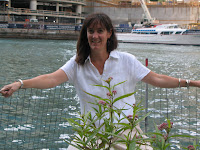Will Chicago remain a 'green' leader under direction of new mayor?

(POSTED: 2/9/11) Beyond the peeps of the juncos, our Sunday morning walk in the woods was quiet with only the baying of beagles to disturb the peace as they welcomed us walking toward them on a path. Last week’s journey north provided more with a drive-by glance of a red-tailed hawk gobbling a squirrel along I-94 and, at Linne Woods, the surreal sighting of a doe and a squirrel sharing white bread crumbs sprinkled on the snow. Later we saw a small mouse or vole in the meadow there, which leapt from his snowbound corridor to escape the snuffling nose of the hopefully-harmless black lab mix walking with us.
That wildlife is all around us if only we look is becoming truer all the time. Since the early 1970s, for example, fish species in the Chicago River system have sky rocketed, beavers are back and the much maligned white-tailed deer are everywhere.
Many of the creatures making their way back to the region have been invited and encouraged by the work of countless partners: Volunteers, environmental groups, neighborhood associations and city government, with the help of strong laws such as the Clean Water Act and the vision of leaders, including Chicago Mayor Richard M. Daley. Daley established the Department of Environment and made real advancements in land acquisition, restoration, studies, ordinances and policies such as the Chicago River Agenda that laid a strong foundation for restoration and stewardship.
A pleasant surprise came last week when the candidates for Chicago mayor almost exclusively answered YES to a list of 20 questions developed by a coalition of environmental and conservation groups. Setting the stage for the Green Growth Platform, the questionnaire covered a broad spectrum of essential environmental topics ranging from developing clean energy and cleaning up old highly polluting coal plants to improving recycling citywide, conserving water, protecting Lake Michigan and the Chicago River, promoting clean transportation and better mobility, as well as creating more parks and open space.
Several of the YES answers directly connect to better protecting wildlife and their habitat, including mitigating climate change, sewage effluent disinfection, using green technologies for stormwater management, stopping aquatic invasive species and preserving Lake Calumet.
That the mayoral candidates are on board and educated on so many issues (click here for more info) bodes well for what happens next in Chicago. Many conservationists fear we may lose the momentum brought on by Daley’s leadership. Yet instead of a fumble on the environmental front with a new mayor, the candidates appear to agree that Chicago’s recognized role as an environmental leader should be capitalized on not thrown under a bus as someone’s else pet project.
Maps of Illinois show us that the area surrounding Chicago has some of the most wonderful and most remaining natural lands in the state. With 68,000 acres of Forest Preserve in Cook County alone, and a goal for thousands more, we have opportunity to continue to improve.
At this point we are a long way from perfect — like the squirrel and the white-tailed deer dining on white bread crumbs — but there is still adventure to be had and wonder to experience. And because of that I am always up for a Sunday morning walk in the woods.
Margaret Frisbie is the executive director of Friends of the Chicago River, a nonprofit organization that works to improve and protect the Chicago River for the people, plants and animals who share our watershed. A lifelong wildlife enthusiast who grew up hiking our forest preserves and canoeing our streams, Frisbie lives on Chicago's Northwest Side where, despite its urban environment, wildlife is never too far from her door.


0 comments: